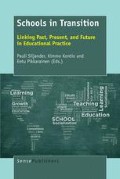Abstract
Why indeed do we have schools? This perennial question has taken on new urgency in our era. As has been widely shown in the scholarly literature, governments the world over have been using educational policy to render schools ever more tightly into instruments of economic, nationalistic, and often xenophobic competitiveness.
Access this chapter
Tax calculation will be finalised at checkout
Purchases are for personal use only
Preview
Unable to display preview. Download preview PDF.
References
Ayers, W., Ayers, R., & Dohm, B. (2001). Zero tolerance: Resisting the drive for punishment in our schools. A handbook for parents, students, educators, and citizens. New York, NY: The New Press.
Carson, A. (1999). The idea of a university (after John Henry Newman). The Threepenny Review, 78, 6–8.
Dewey, J. (1985a). Schools of tomorrow. In J. A. Boydston (Ed.), John Dewey, the middle works 1899–1924: Vol. 8. Essays on education and politics 1915 (pp. 205–404). Carbondale, IL: Southern Illinois University Press.
Dewey, J. (1985b). Democracy and education. In J. A. Boydston (Ed.), John Dewey, the middle works 1899–1924: Vol. 9. Carbondale, IL: Southern Illinois University Press.
Dewey, J. (1988). The public and its problems. In J. A. Boydston (Ed.), John Dewey, the later works 1925–1953: Vol. 2. Essays, reviews, miscellany, and the public and its problems (pp. 235–372). Carbondale, IL: Southern Illinois University Press.
Dewey, J. (1991). Creative democracy – The task before us. In J. A. Boydston (Ed.), John Dewey, the later works 1925–1953: Vol. 14. Essays, reviews, and miscellany (pp. 224–230). Carbondale, IL: Southern Illinois University Press.
Emerson, R. W. (1983). The American scholar. In R. W. Emerson (Ed.), Essays & lectures (pp. 53–71). New York, NY: The Library of America.
Hansen, D. T. (2015, in press). Is education possible today? Teachers College Record.
Kafka, J. (2011). The history of “zero tolerance” in American public schooling. New York, NY: Palgrave Macmillan.
Kohn, A. (1996). Beyond discipline: From compliance to community. Alexandria: Association for Supervision and Curriculum Development.
Lear, J. (1992). Inside and outside the Republic. Phronesis, 37(2), 184–215.
McNeil, L. M. (2000). Contradictions of school reform: Educational costs of standardized testing. New York, NY: Routledge.
Nancy, J.-L. (1996). The Deleuzian fold of thought. In P. Patton (Ed.), Deleuze: A critical reader (pp. 107–113). Oxford: Blackwell.
Nichols, S. L., & Berliner, D. C. (2007). Collateral damage: How high-stakes testing corrupts America’s schools. Cambridge, MA: Harvard Education Press.
Popham, W. J. (2001). The truth about testing. Alexandria, VA: Association for Supervision & Curriculum Development.
Porter, T. M. (1996). Trust in numbers. Princeton, NJ: Princeton University Press.
Ravitch, D. (2010). The death and life of the great American school system: How testing and choice are undermining education. New York, NY: Basic Books.
Reeve, C. D. C. (1992). Introduction. In Plato, Republic (G. M. A. Grube & C. D. C. Reeve, Trans.). Indianapolis, IN: Hackett.
Ryle, G. (1966). Dilemmas. Cambridge: Cambridge University Press.
Sandel, M. J. (1982). Liberalism and the limits of justice. Cambridge, UK: Cambridge University Press.
Scheffler, I. (1973). Reason and teaching. Indianapolis, IN: Bobbs-Merrill.
Shepard, L. A. (2000). The role of assessment in a learning culture. Educational Researcher, 29(7), 4–14.
Shepard, L. A. (2005). Linking formative assessment to scaffolding. Educational Leadership, 63(3), 66–70.
Sockett, H. (2012). Knowledge and virtue in teaching and learning: The primacy of dispositions. New York, NY: Routledge.
Tanner, L. N. (1997). Dewey laboratory school: Lessons for today. New York, NY: Teachers College Press.
Editor information
Editors and Affiliations
Rights and permissions
Copyright information
© 2016 Sense Publishers
About this chapter
Cite this chapter
Hansen, D.T., Davis, J. (2016). A Philosophical School for Our Time. In: Siljander, P., Kontio, K., Pikkarainen, E. (eds) Schools in Transition. SensePublishers, Rotterdam. https://doi.org/10.1007/978-94-6300-827-3_2
Download citation
DOI: https://doi.org/10.1007/978-94-6300-827-3_2
Publisher Name: SensePublishers, Rotterdam
Online ISBN: 978-94-6300-827-3
eBook Packages: EducationEducation (R0)

